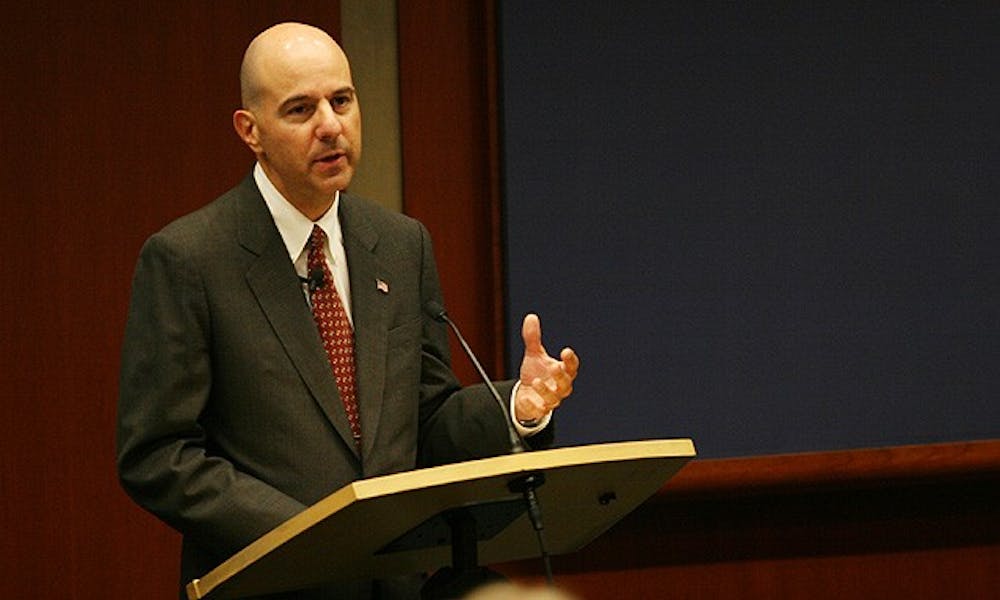Getting the next big product on the market may just have gotten a little easier for inventors nationwide.
The new American Invents Act protects the rights of inventors to ensure that the American economy will continue to grow, said David Kappos, undersecretary of commerce for intellectual property and director of the United States Patent and Trademark Office.
Kappos spoke Tuesday about the AIA, which he helped to create, at the annual Meredith and Kip Frey Lecture in Intellectual Property at the School of Law. The act was signed into law by President Barack Obama in September. Kappos said with the legislation, the United States is updating intellectual property protection for industry ..and labor sectors previously under-protected, in order to guarantee economic growth.
Kappos added that he believes the United States is still at the forefront of global innovation.
“We live in an age where technology change occurs in the blink of an eye,” Kappos said. “The patent reform boosts confidence and inventor willingness in turning their ideas into reality.... We are to ensure new jobs, new industry are kept in this country, not elsewhere.”
He noted that by implementing this law, the USPTO is able to match the volume of incoming inventions with and increasingly efficient patenting process, a challenge previously faced by agencies.
“The AIA is an historic piece of legislation for our country, because in the centuries since that first patent examiner, Thomas Jefferson, who viewed and granted U.S. patents, our nation has observed sweeping revolutions in the pace of innovation but no [accompanying], comprehensive legislative adjustment to patent policy,” he said.
The AIA switches the U.S. patent system from a “first to invent” to a “first to file” system—meaning inventors must now be the first to file their product, not just the first to invent it. This reduces a great deal of patent application backlog, Kappos said. In addition to outlining the key provisions of the AIA, Kappos noted the act’s impact on USPTO patent quality, speed and clarity. Kappos added that clear, objective and simple standards are the foundation to quality.
“By building the world’s first and only 21st-century patent system—fit to manage the demands of a globalized economy—this new law enables a better-resourced USPTO to grant [intellectual property] rights with greater speed, greater clarity and greater quality,” Kappos said.
This patent law reform was necessitated by the fundamental importance of patent rights to the national economy and the rapid pace of technological growth, Kappos said.
By adopting the “first to file” policy, pattern priority ensures that small companies are able to navigate on a more equal level of competition with their larger counterparts.
“The act helps those small companies reduce their costs.... The law better protects new entrances,” Kappos said.
Kappos noted that the Research Triangle is an exciting area for new ideas and American innovation. It requires particular protection under the new law to ensure that enough incentives are given so that great ideas can be translated into products in the marketplace.
Kappos said the AIA will help America, a nation famous for inventions, succeed and he was thrilled that the United States was able to implement this law.
Victoria Christian, chief operating office of the Duke Translational Research Institute, asked Kappos about the problems pertaining to world trade as a result of the lack of a universal intellectual property standards. In response, Kappos spoke about the success of Asia-Pacific Economic Cooperation conference, which he attended, as an example of a “matrix of harmonization” working toward solving a global patent problem.
Blake Hurt, a lawyer in Cary, N.C., commented on the difficulties of harmonization, which the AIA will make easier.
“The U.S. patent system is very different from any other system in the rest of the world, which puts us in a great disadvantage,” Hurt said.
Get The Chronicle straight to your inbox
Signup for our weekly newsletter. Cancel at any time.

